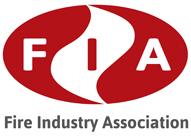Candidates can now get qualified to become fire detection and alarm designers, installers, maintainers, and commissioners. After the launch of four new fire detection and alarm qualifications in designing, installing, maintaining, and commissioning of fire detection and alarm equipment earlier this year, the Fire Industry Association has announced that bookings can now be made on the FIA website.
The courses will lead to a certificate upon completion, which will be equivalent to an A-Level.
Michael Gregg, the FIA’s Training Manager, said: “We have designed these courses following the syllabus set by the newly formed Fire Industry Association Awarding Organisation. We have put together a robust set of classroom based learning days that will aid learners in their development – not just in preparing for the examinations, but also in a way that aims to improve their overall knowledge and understanding of the knowledge and concepts presented.”
For each qualification there are four units of study; all have to be passed to gain the certificate at the end and be awarded the qualification. The FIA calls this an important step forward in formalising the process and developing service technicians in the fire detection and alarm sector. The FIA says that it has invested significantly into developing new course materials which cover everything studied, explaining each concept in detail. By the end of the course, learners should be able to have much more understanding of their subject area (whether in fire detection and alarm design, installation, maintenance, or commissioning).
The new qualifications are available via the Training section of the FIA’s website. Upon making an initial booking, web users will only be able to book the first unit (the Foundation in Fire Detection and Alarms course), and will only be able to progress to the other units until learners have taken and passed the Foundation unit. This is to ensure that learners are learning the material in the right order; progressing from one unit to another with the level of difficultly increasing.
Upon making a booking for the Foundation unit (the first unit of each of the four qualifications available), each learner will be assigned a Unique Learner Number (ULN). This number will be required to both book further units of the qualification. For those coming in fresh, this can be a way to get qualified in an industry that is the FIA says desperate for more technicians. There is a well-known shortage of technicians in the fire detection and alarm industry, and companies are desperate to hire and train new workers.
Michael Gregg added: “The new qualifications have been hotly anticipated and we are expecting a large volume of bookings to come in. For that reason, we recommend booking as soon as possible, as spaces on each course are limited by class size.”
Courses can be booked for locations across the UK, allowing learners to access the learning from the nearest training centre. A prospectus is available electronically from the Fire Industry Association’s website, or a hard copy can be requested by calling the number on the website.









